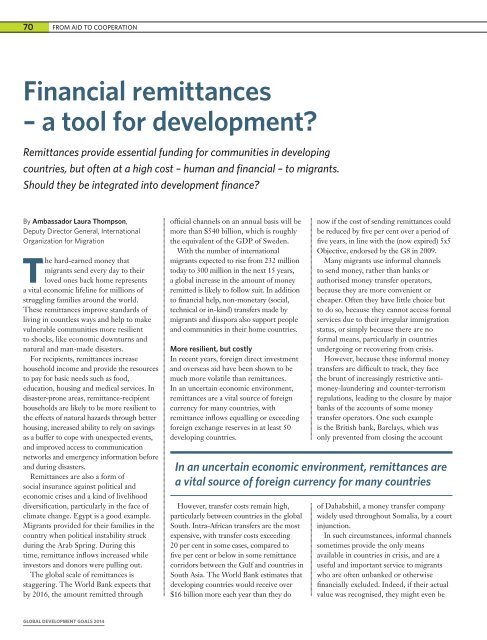FAMBB
FAMBB
FAMBB
You also want an ePaper? Increase the reach of your titles
YUMPU automatically turns print PDFs into web optimized ePapers that Google loves.
70 FROM AID TO COOPERATIONFinancial remittances– a tool for development?Remittances provide essential funding for communities in developingcountries, but often at a high cost – human and financial – to migrants.Should they be integrated into development finance?By Ambassador Laura Thompson,Deputy Director General, InternationalOrganization for MigrationThe hard-earned money thatmigrants send every day to theirloved ones back home representsa vital economic lifeline for millions ofstruggling families around the world.These remittances improve standards ofliving in countless ways and help to makevulnerable communities more resilientto shocks, like economic downturns andnatural and man-made disasters.For recipients, remittances increasehousehold income and provide the resourcesto pay for basic needs such as food,education, housing and medical services. Indisaster-prone areas, remittance-recipienthouseholds are likely to be more resilient tothe effects of natural hazards through betterhousing, increased ability to rely on savingsas a buffer to cope with unexpected events,and improved access to communicationnetworks and emergency information beforeand during disasters.Remittances are also a form ofsocial insurance against political andeconomic crises and a kind of livelihooddiversification, particularly in the face ofclimate change. Egypt is a good example.Migrants provided for their families in thecountry when political instability struckduring the Arab Spring. During thistime, remittance inflows increased whileinvestors and donors were pulling out.The global scale of remittances isstaggering. The World Bank expects thatby 2016, the amount remitted throughofficial channels on an annual basis will bemore than $540 billion, which is roughlythe equivalent of the GDP of Sweden.With the number of internationalmigrants expected to rise from 232 milliontoday to 300 million in the next 15 years,a global increase in the amount of moneyremitted is likely to follow suit. In additionto financial help, non-monetary (social,technical or in-kind) transfers made bymigrants and diaspora also support peopleand communities in their home countries.More resilient, but costlyIn recent years, foreign direct investmentand overseas aid have been shown to bemuch more volatile than remittances.In an uncertain economic environment,remittances are a vital source of foreigncurrency for many countries, withremittance inflows equalling or exceedingforeign exchange reserves in at least 50developing countries.now if the cost of sending remittances couldbe reduced by five per cent over a period offive years, in line with the (now expired) 5x5Objective, endorsed by the G8 in 2009.Many migrants use informal channelsto send money, rather than banks orauthorised money transfer operators,because they are more convenient orcheaper. Often they have little choice butto do so, because they cannot access formalservices due to their irregular immigrationstatus, or simply because there are noformal means, particularly in countriesundergoing or recovering from crisis.However, because these informal moneytransfers are difficult to track, they facethe brunt of increasingly restrictive antimoney-launderingand counter-terrorismregulations, leading to the closure by majorbanks of the accounts of some moneytransfer operators. One such exampleis the British bank, Barclays, which wasonly prevented from closing the accountIn an uncertain economic environment, remittances area vital source of foreign currency for many countriesHowever, transfer costs remain high,particularly between countries in the globalSouth. Intra-African transfers are the mostexpensive, with transfer costs exceeding20 per cent in some cases, compared tofive per cent or below in some remittancecorridors between the Gulf and countries inSouth Asia. The World Bank estimates thatdeveloping countries would receive over$16 billion more each year than they doof Dahabshiil, a money transfer companywidely used throughout Somalia, by a courtinjunction.In such circumstances, informal channelssometimes provide the only meansavailable in countries in crisis, and are auseful and important service to migrantswho are often unbanked or otherwisefinancially excluded. Indeed, if their actualvalue was recognised, they might even beGLOBAL DEVELOPMENT GOALS 2014


